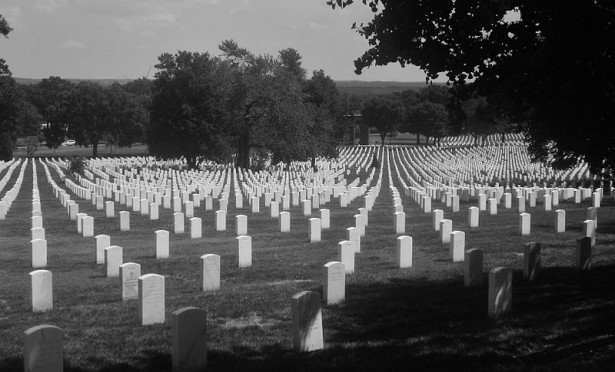
“I love Arlington,” said Rep. Jim Cooper. “But it’s not big enough for all future wars.”
The Tennessee Democrat was commenting on a plan to dramatically increase the size of Arlington National Cemetery that was announced this week. As reported in the Washington Post, “one of the largest expansions in decades” of the nation’s premier military cemetery is being considered, in order to provide space to bury U.S. soldiers well into the 2050s. The planned expansion has provoked controversy, but mostly the public debate has centered on environmental impacts and land-use issues. Perhaps, though, it should focus at least as much attention on the implications of preparing for all those “future wars.”
Arlington will continue to provide final resting places for U.S. veterans who served in past conflicts, from World War II through the recent Iraq War. But the additional 27,000 internment sites will, as the Tennessee member of Congress stressed, also provide space for soldiers killed in wars not yet on the horizon — including those not born yet.
This fact should give us pause — not only about the logistics of providing for our war dead, but about the larger direction in which our country is headed. This cemetery expansion, though it can be regarded simply as a practical exigency, is symbolic of a doubling-down on war-making well into the future. While this is unsurprising, maybe something like Arlington’s expansion can bring yet another string of wars going forward into focus. Do we want this future? And if not, what do we do about it?
Gone are the days when the rhetorical frame selling U.S. intervention was “the war to end all wars.” This is not only because President Woodrow Wilson’s solemnly poetic flourish — designed to justify U.S. entry into World War I — turned out to be untrue. It’s because the posture since World War II, and especially since 9/11, has been one of endless war. Overt war, covert war, hot war, cold war (and the incessant “tepid” wars — tepid for everyone except those on the receiving end of them — fueled by institutionalized counter-insurgency, global strike forces, and the remote control combat of the emerging drones culture) comprise the menu of permanent war options increasingly established over the past 60 years.
It is often a short step from honoring the war dead to honoring, and perpetuating, the wars they fought. Military cemeteries (but also war statuary, battlefield national landmarks, and public military displays, like the ones I remember attending at the Seattle Coliseum when I was a kid at the height of the Vietnam War) rarely lend themselves to critique the wars from which they flow. The military cemetery’s form itself — numberless rows of white markers, sober grandeur, stark silence, unity of purpose, and the poignant rituals of grief it havens — undercuts the troubling awareness of the particularities of combat (its purported reasons, its myriad decisions, its gritty, split-second fallout) through which these often young lives have been extinguished. The troubling questions that by rights should be asked are often enveloped in a numbing abstraction that feeds on the keen need for meaning in the face of meaninglessness. And so, quietly but steadily, the seeds of the next war are planted in the soil of past and present ones.
This is not new. It was the point of Pericles’s speech in Athens 2,500 years ago: the sacrifices made by those slain in war should spur on more war-making, not less. Pericles 2.0 is methodically at work in our society, urging us to ignore the disaster of the last decade of war and re-up for decades more. But we needn’t go along. Fortunately there are growing campaigns calling for significant reductions in the Pentagon’s budget and for an end to drones. At heart, these efforts are calling for a national reckoning of the nation’s full-bore commitment to endless war and to war-making on auto-drive going forward.
As with so many struggles for change, nonviolent action will be needed to help prompt a society-wide conversation on the fundamental course we will take: a culture of war or a culture of nonviolent options. One entry point might include a campaign to stop the expansion of Arlington Cemetery, inspired by the determination to assign no more real estate to wars in the making.
